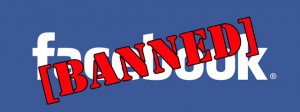
Facebook Banned in Pakistan – May 2010
There’s a notion of two distinct America’s; one that is conservative, mostly Republican Red and the other a more liberal Democratic Blue, and in a similar way I see two Pakistan’s this week.
Case in point: the Pakistan Telecommunications Authority severed access to the worlds largest social networking site this week when a Lawyers Association won a court injunction officially banning Facebook because of a page entitled “Post Drawings of Prophet Mohammad Day”. As of now, the Pakistan government has added YouTube, and certain pages on Flickr and Wikipedia to the ban list which is either fueling vehement support of the ban (a conservative, we’ll say Red thing to do) and protests against Facebook or a eliciting a total opposite response “God save this country, lunatics are running it” (a more liberal, response we’ll label Blue).
The polarized views are reminiscent of our own democratic deliberations; strong demonstrations for (Red) and against (Blue) the legality of the Iraq invasion beginning in 2004, or protests against the passage of Proposition 8 (Blue) in California which outlawed same sex marriage in 2008 (Red).
So do such polar views necessarily indicate a distinctly Blue and Red America? I’ve never thought so, because overallAmerican’s tend to be far more centrist than our elected officials make us out to be in a two party system. Generally, Americans from California to New York and everywhere in between share basic social and cultural values; we watch the same shows, dress similarly, and ultimately ascribe to the values outlined in our Constitution (albeit interpretations differ).
But Pakistan is very different. There is far less social homogeneousness and more indications of a vastly distinct populace, a Red and Blue Pakistan if you will. Citizens from the remote, more rural northern areas bordering Afghanistan, or Red places will likely dress, consume, and believe differently than people in the more cosmopolitan hustle and bustle of large cities like Karachi, or Blue Pakistan.
Pakistani’s are educated on vastly different scales. While one child might be raised in a feudal system from a village in Sindh with no education, another might be educated per the Cambridge system in a large city, while another might have only had formal training in religious studies at a Madrassah! In terms of dress; it’s not uncommon to find females covered in burqa’s from head to toe, no face, hands or even eyes showing (Red), while you’ll find other’s in the skimpiest of attire partying until daybreak (Blue), at which point some Pakistani’s may rise to pray at a local Mosque while others are just getting home from a night of drinking and dancing. It’s Red and Blue if i’ve ever seen it, if not as stark as the contrast of Black on White.
So there’s an enormous diversity in belief systems that is more immediately recognized in the Pakistani landscape than in ours. I recall living there while in High School and being shocked at the level of ignorance toward America by some and whole hearted embrace of western culture by others. But polar lifestyles and belief systems amongst Pakistani’s doesn’t indicate there isn’t a grey area of people who fall in between two extremes, nor does it mean the group perceived as more “western” is necessarily against the ban on Facebook. In fact, notorious party animal and international rock star Ali Azmat didn’t denounce the censorship:
“Musician Ali Azmat said the issue should be dealt with sternly so that no such thing takes place in the future. “Every Muslim condemns this act, but it should be handled responsibly because we have to maintain our image. I have registered my condemnation of the relevant Facebook page.”
And that’s when I start to worry. If so called “liberal” personalities in Pakistan can be overworked over the Facebook page and fail to renounce such short sighted legislation, I shudder to think of how widespread acceptance of unnecessary censorship still is in Pakistan.
I’ll be the first to say the Facebook page is in poor taste, it’s a sorry excuse for a cause and the fact that it does not have even a 20k following yet is testimony to how silly it is. Thus the futility of the inane effort makes the Pakistani ban a disproportionate, counter productive response.
The page does not incite hate or violence and I would go so far as to say it posed an opportunity for the Pakistani government to lead its citizens to moderation in this instance. After violent protests against the Danish cartoons which forever mar the image of Muslims today, Pakistan missed a chance to demonstrate Islamic sensibility.
By banning Facebook over a trivial issue the government makes a mockery of it’s people, Red and Blue alike. Officially designated as The Islamic Republic of Pakistan, the government carries a profound responsibility to simultaneously uphold freedom and religious consciousness. Not an easy task, but the last thing Pakistan needs right now is are further riled extremists and increased Anti-Americanism.